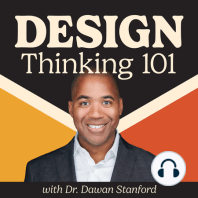62 min listen

Designing for Behavior Change + Ethics + Tools with Stephen Wendel — DT101 E54
Designing for Behavior Change + Ethics + Tools with Stephen Wendel — DT101 E54
ratings:
Length:
37 minutes
Released:
Sep 15, 2020
Format:
Podcast episode
Description
Steve Wendel is the author of Designing for Behavior Change, Founder of the Action Design Network, and head of Behavioral Science at Morningstar. We talk about behavioral problem solving, his new book, ethics and behavior design, and his toolkit for anyone who wants to apply behavioral science now. Show Host: Dawan Stanford Show Summary Stephen began working with behavioral science during his years at HelloWallet. He was seeking to create products that were more attuned to the mindset of, and challenges experienced by, its customers. Stephen believes that behavioral science needs to be used not just to better understand our limitations and challenges, but also to help us discover and build the tools and solutions we need to overcome those limitations. One of Stephen’s goals has been to simplify aspects of behavioral science so that more people can use it in their work. His new book, Designing for Behavior Change, and companion workbook offers readers tools and processes that are accessible, practical, and easy to use. Stephen also offers his thoughts and advice on how behavioral science can help us rethink how we live, work, and succeed in the current COVID-19 health crisis environment, and how this time is one of tremendous opportunity when it comes to forming new life habits, not just on an individual scale, but on a societal one as well. Listen in to learn more about: How behavioral science is used in the creation of products and services Ethical questions and challenges that arise in the behavioral science and behavior design fields The synergy between behavioral science and design The new edition of Stephen’s book, Designing for Behavior Change Stephen’s new tool, the Decide Framework Action versus outcome and defining the problem space Our Guest’s Bio Dr. Wendel is a behavioral scientist who studies financial behavior and how digital products can help individuals manage their money more effectively. He serves as Head of Behavioral Science at Morningstar, where he leads a team of behavioral scientists and practitioners to conduct original research on saving and investment behavior. Stephen has authored three books on applied behavioral science (Designing for Behavior Change, Improving Employee Benefits, and Spiritual Design) and he founded the non-profit Action Design Network: educating the public on how to apply behavioral research to product development with monthly events in fifteen cities. He has two wonderful kids, who don’t care about behavioral science at all. Show Highlights [02:27] Stephen’s introduction to behavioral science and behavior design. [03:35] How Stephen helps others understand behavioral design and how to apply it. [04:42] Stephen’s book is a synthesis of what’s being done and the tools being used across the behavioral science and design communities. [05:47] Stephen discusses his writing process for Designing for Behavior Change. [06:17] A new section of the book offers real-world examples of behavioral science teams and work. [06:50] The book offers a guide for those wanting to enter the field. [06:56] Stephen talks about expanding the book’s ethics section. [07:49] Stephen built the Decide Framework for the book, synthesizing best practices from behavioral science teams around the world. [08:36] The way behavioral science ethics have evolved, and how Stephen approaches the ethical challenges inherent in the work. [09:56] A few real-world examples of abuses of behavioral science and behavior design. [10:50] Behavioral science can be manipulative. [12:27] Using behavioral science to better ourselves and to set the ethical tone in our work. [14:01] Stephen discusses purposefully writing about the ethical challenges in order to give them more visibility in the behavioral science field. [15:16] How Milton Glaser’s Road to Hell is applicable to behavioral science. [16:40] More about the Decide Framework and how to use it. [20:13] The importance of clearly defining the problem before beginnin
Released:
Sep 15, 2020
Format:
Podcast episode
Titles in the series (100)
Healthcare Design Teams + Wellness + ScienceXDesign with Chris McCarthy — DT101 E24: Welcome to the Design Thinking podcast! I’m Dawan Stanford, your host. Today I’m interviewing Chris McCarthy. He is the Vice President of Strategy & Design at Hopelab where he is excited to deepen its impact on the health and wellness of young... by Design Thinking 101